hello friends! new(ish)!
Redacted.sh Guide
This is a digitised version of the 'How Do I Pass the Redacted interview' pdf guide. Part 1 deals with shit that is already on interviewfor.red/en/index.html but it's more detailed/modified in parts and part 2 is answers to common question and shit like that.
Ensure that you use your own words before sitting the interview.
The interview address is: https://interviewfor.red/en/index.html and it is conducted via IRC.
Analogue vs digital
Analogue
- Needs to be converted from analogue → digital (eg FLAC, MP3) via converter to a file that the PC can read
- Analogue medium: Stores music in an object being physically altered to produce sound
- Examples
- A tape recorder changes the magnetization of magnetic tape in a cassette tape to record sound. Plugging a tape deck into a recording device makes a digital copy of the analog cassette tape.
- A record cutter carves grooves in a vinyl record to make a physical representation of the sound. Ripping vinyl through a preamp and into a sound card makes a digital copy of the analog vinyl
- Allowed
- Vinyl (always)
- Cassette under strict conditions
Digital
- Already encoded as a PC readable format
- Digital medium: object storing music in digital files (a binary number string)
- Examples
- CDs
- DVDs
- Super Audio CDs (SACD)
- WEB store downloads (iTunes, Amazon, etc.)
- Allowed
- after using spectral analysis to check for lossy transcodes
Why analogue or digital?
- Some people prefer the “feel” of vinyl and think that music on vinyl records sounds “warmer” and “fuller”
- Others think that digital sources provide an unadulterated and pristine listening experience.
Audio Format
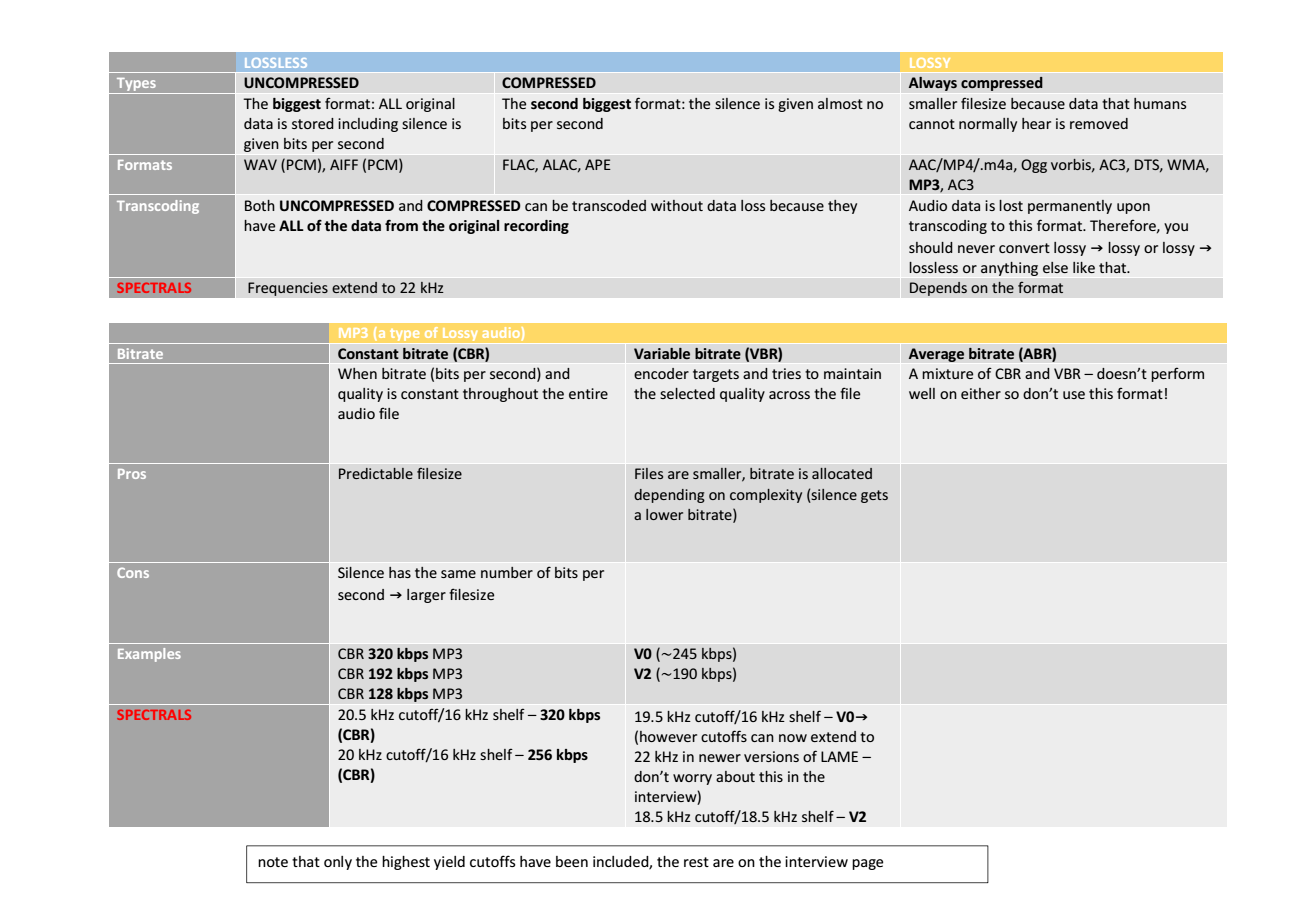
- a type of computer file that stores music. Music formats are either uncompressed lossless, compressed lossless, or lossy
- Bitrate: number of bits conveyed/transferred within a unit of time. Units = kbps (kilobits per second). eg CBR file has 320kbps
- Transparency: When the audible quality of a lossy file is such that the difference between the lossless and lossy file cannot be a differentiated by a human ear. Usually MP3 192kbps CBR is considered transparent
Programs
- Encoders
- LAME (LAME Ain’t An MP3 Encoder): An open source encoder allowing customisable conversion and compression able to output high quality mp3s. You can dictate a constant, variable or average bit rate
- Viewing Spectrals
- Spek, Adobe Auditions, Audacity
- checking bitrate
- this is what the bitrate/preset the file claims to be
- Audio Identifier or dbPowerAmp on Windows and dnuos or MediaInfo on Mac OS
Transcoding
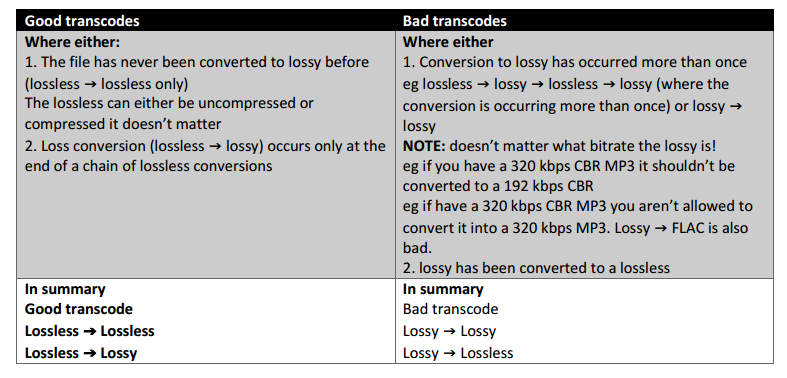
- The conversion from one format to another, especially of music
- Transcode (noun). Means a file that has be transcoded (converted from one format to another). Can be a negative term
Spectral Analysis
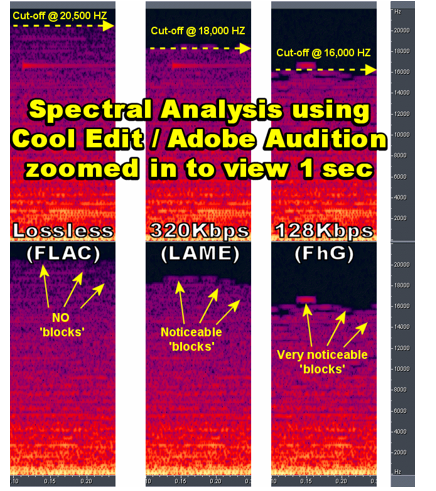
- Allows you to determine whether or not a file is a TRANSCODE by visualising data in music
- lower notes have lower frequencies, higher notes have higher frequency
- Signs of a transcode
- especially in old versions of LAME: The shelf/cutoff is lower than it should be and there are grain holes in the data (this can be quite difficult to see but if you create your own transcodes and flip between them it is much more obvious DO NOT WORRY ABOUT THIS FOR THE INTERVIEW, ONLY CARE ABOUT THE CUTOFFS)
- The only obvious features you should worry about are on this page: https://interviewfor.red/en/spectrals.html
- especially in old versions of LAME: The shelf/cutoff is lower than it should be and there are grain holes in the data (this can be quite difficult to see but if you create your own transcodes and flip between them it is much more obvious DO NOT WORRY ABOUT THIS FOR THE INTERVIEW, ONLY CARE ABOUT THE CUTOFFS)
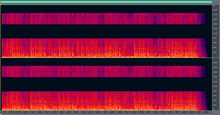
- gaps in the webrip (Left)
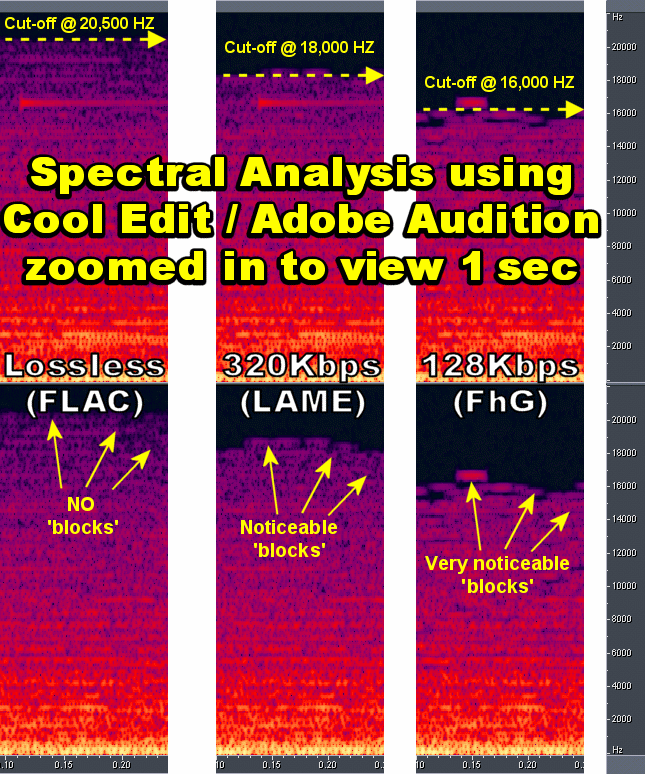
- noticeable blockiness/lack of a smooth gradient (Left)
- So for example if you have a FLAC that has a cutoff at 20 khz this suggests that it is actually a 256 kbps MP3 and not a FLAC (because a real FLAC should go up to 22 khz) please refer to https://interviewfor.red/en/index.html for the full list
- A lossy master is when the recording has been converted to a lossy format before it is sold to the public – this means that it’s basically a transcode (however this was allowed on PTH as long as it is approved by the moderators)
CD Burning and CD Ripping
- Burning – making a CD from music files
- Ripping – extraction of music from a CD
Log files: .txt file with the extension .log recording the ripping process and records errors which have occurred. NEVER modify it Cue files: .txt file with the extension .cue which acts as a catalog or table of contents of a CD. Enables the burning of a CD identical to the original.
- Programs: EAC (Exact audio copy) on Windows or Linux (w/ WINE) and XLD on MAC.
Torrenting
- this section is literally filler as you can get all the answers from the rules/interview notes on the site as long as you know how to use a torrent client – some of the stuff is missing but is on the https://interviewfor.red/en/torrenting.html and you should already know it
Bittorrent
- .torrent: Contains data you want to download do not modify it
- peers: people who have added the same .torrent to their torrent client
- partial seeder: they only have only part of the files but aren’t going to download the rest yet they appear like a leecher
- DO NOT DOWNLOAD MASSIVE FILES SHOWING LEECHERS with the intent of seeding back the buffer
- leeching: the act of downloading the file
- required in order to receive upload credit
- the amount of upload credit received depends on peering (how likely it is for other people are to ask you for a piece: can depend on your geography aka a seeder and leecher in the same country may be more likely to share data) and upload speed
- required in order to receive upload credit
- seeding: the act of sharing data during after the torrent download has completed
- BitTorrent client: something that allows you to download and upload
- only certain clients/versions are allowed, check the client whitelist
Ratio
Ratio = Amount uploaded/Amount downloaded
- Ideally you should stick to a ratio of 1 or more
- less than one = you downloaded more than you shared
- Refer to the required ratio page in rules (you can be penalised if your ratio falls too low) and put on ratio watch where your ability to download (leech) is removed – to get them back you will need to fill requests or upload new torrents
- required ratio can also be lowered by seeding 100% of the torrents you download for at least 72 hours each week
- more than one = you uploaded more than you shared
- If your ratio is too high this means that you are hoarding the amount uploaded and are not giving enough back to the community
- less than one = you downloaded more than you shared
Freeleech
- The amount of data downloaded is not recorded in your ratio but your upload is
Neutral leech
- The amount of data downloaded and the amount of data uploaded is not recorded in your ratio
Connecting
- Port forwarding: Allows computers on the public internet to connect directly to your computer
- if you are not port forwarding, the amount of data you can upload will be significantly limited
- Distributed Hash Table (DHT): How torrent clients find each other
- Enabling this is bad for private trackers as it allows people who are not members of the community to find private torrents and download from private tracker users
- However, any torrent client approved by PTH will automatically respect the private flag inside PTH torrents and will not share information with people who don’t have a copy of the .torrent with a private flag
- Still, you should disable DHT in your client
- Enabling this is bad for private trackers as it allows people who are not members of the community to find private torrents and download from private tracker users
- Marking torrents as private: You should mark your PTH torrents as private to prevent users who are not PTH members from finding your torrents
Additional resources
Explanations
http://www.reddit.com/r/trap/comments/2bifbx/transcode_spectral_study_a_primer_on_spectral/
http://wiki.hydrogenaud.io/index.php?title=Main_Page
Practice what.cd interview questions
Past what.cd interviews
They say I cheated!
If you take more than 3 minutes to answer a question, they will ask you if you cheated and to be honest about it, or you won't be able to pass the interview again. Even if you didn't cheat, say that you cheated. They are totally serious about it, and won't hesitate to ban your IP from the interview iRC if you keep denying. Don't try to argue, even if you didn't cheat. Yeah, that's dumb, but that's how it is.
Redacted.sh interview (tips to passing on the first go)

- this is literally the same as the what.cd interview but apparently easier because the circulating internet copies are missing the spectral section
What you must know – the two most highly failed errors
- How to detect if a spectral doesn’t match up to the supposed bitrate (which apparently isn’t on the leaked copies of redacted interviews circulating around BUT YOU MUST KNOW THIS JUST IN CASE)
- Analysing spectrals is easy. The cutoff point indicates what bitrate the music actually is (If it’s a transcode from a lower bitrate then it will have a lower cutoff than it should normally have). If the cutoff is slightly fuzzy go with whatever most looks like a horizontal cutoff point
- look at the example (right)
- Analysing spectrals is easy. The cutoff point indicates what bitrate the music actually is (If it’s a transcode from a lower bitrate then it will have a lower cutoff than it should normally have). If the cutoff is slightly fuzzy go with whatever most looks like a horizontal cutoff point
- What transcodes are allowed
- these questions will show a series of transcodes marked by arrows, you must be able to tell which transcodes allowed and which aren’t and be able to explain why
- if you don’t know how to explain it – read Sleepysaint’s guide https://pastebin.com/eMEQGFMJ
- if you consistently fuck up the transcoding questions, you will 100% fail!
- these questions will show a series of transcodes marked by arrows, you must be able to tell which transcodes allowed and which aren’t and be able to explain why
- Do not insult/swear at the interviewer, do not insist that you want to commit a genocide and do not pursue a line of thought that contradicts the interviewer. Try to be concise.
Interview tips
- Use a computer – phones won’t cut it because you will be waiting for hours
- Figure out how to make your client notify you when your name is mentioned or else you will be watching your IRC client for hours
- You do not need to know everything off by heart unless you are slow at locating information in a document
- When the interview begins you will be asked to take a screenshot of your desktop – just open your notes after it or print them out
- They may be logging IPs that open the redacted interview webpage after the interview starts so downloading/printing of what you need first or having this/your notes open might be more helpful
- Do not take too long to answer all the questions
All the questions on the leaked Redacted.sh answered
What does the bitrate of an audio file tell you?
Regurgitate the bitrate definition.
What do CBR and VBR mean? What is the difference between the two?
Regurgitate the differences.
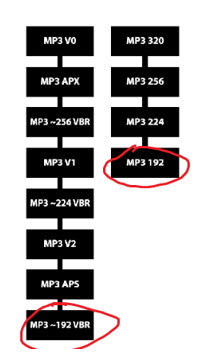
What are the minimum CBR/VBR bitrate that redacted allows to be uploaded?
- CBR is basically the MP3 320, 256, 224, 192 etc
- VBR is typically denoted by V0, V1, V2 etc
- Answers are circled (right)
What are the lowest and highest possible (not just on RED) VBR presets?
- read http://wiki.hydrogenaud.io/index.php?title=LAME
- Highest V0, lowest V9 (lowest fractional is 9.999)
What are some advantages and disadvantages of VBR over CBR?
Regurgitate the pros and cons in my table.
What is the difference between a lossy and a lossless encode? Why would you choose one over the other?
Regurgitate file size vs quality.
Which of the following are lossless encodes? List the letters only – WMA, WAV (PCM), ALAC, AC3, APE, MP3 320 (CBR), FLAC, AIFF (PCM)
Don’t panic and look up the table. WAV (PCM), ALAC, APE, AIFF (PCM), FLAC.
Which of WMA, AC3, FLAC, MP3 128 CBR, MP3 V4, MP3 V1, MP3 320 CBR are allowed to be uploaded to redacted?
AC3, FLAC, MP3 V1, MP3 320 CBR. See allowed audio formats and allowed MP3 VBR formats.
What is LAME? What does it do?
Regurgitate answer.
What might be a reason for someone to transcode from a WAV (PCM) or AIFF (PCM) to FLAC?
Doesn’t exactly get fully covered by the notes.
Reason 1: Silence is given almost no bits per second with no data loss resulting in a smaller file size and preserved quality
Reason 2: Your program/device can only play FLAC and not WAV or AIFF.
Reason 3: Redacted only lets you upload FLAC.
If you have an MP3 but are unsure what VBR preset/CBR bitrate it is, what options do you have to find out?
- Audio Identifier or dbPowerAmp on Windows and dnuos or MediaInfo on Mac OS
- But really you should also look at the spectrogram to confirm that what it claims is the same as it actually is
What is a transcode? What is it used for?
Regurgitation. Transcoding is the conversion of music from what format to another typically with removed data as in the case of lossless to lossy in exchange for a smaller file size. Also some devices not be able to play certain lossless music formats.
For the following which are good transcodes and which are bad? If the transcode is bad explain why.
A) Retail CD -> WAV (PCM) -> APE -> MP3 256 (CBR) -> MP3 V2 (VBR)
- MP3 256 (CBR) -> MP3 V2 (VBR)
- lossy → lossy results in avoidable DATA LOSS → BAD!
- Every time a lossy encode occurs the quality decreases so a lossless → CBR 256 → MP3 V2 is worse quality than lossless → V2
B) Retail Vinyl -> WAV (PCM) -> MP3 320 (CBR)
- Good lossless → lossy only at the end of the chain
C) Retail Vinyl -> ALAC -> MP3 V0 (VBR) -> AAC 192
- MP3 V0 (VBR) -> AAC 192
- lossy → lossy results in avoidable DATA LOSS → BAD!
D) Retail Vinyl -> ALAC -> MP3 V0 (VBR) -> ALAC
- BAD! – No mention of why this is so on the interview notes but basically once a lossless → lossy has occurred the loss of data is irrevocable and even if you convert lossy → lossless the data is not restored. Basically your file is now larger for no purpose whatsoever.
- Hydrogenaudio lists the following cases for why lossy → lossless encoding may occur (but do not mention any of these as one person on /ptg/ has already gotten in trouble for trying to argue for it and making the interviewer feel inadequate)
- Archiving audio originally in an obsolete or proprietary lossy format, without introducing additional loss.
- Editing audio that can't be directly edited in the lossy format.
- As an in-between format for lossy-to-lossy encoding.
E) Retail CD -> AIFF (PCM) -> MP3 V4 (VBR) -> MP3 V0 (VBR)
- MP3 V4 (VBR) -> MP3 V0 (VBR)
- lossy → lossy results in avoidable DATA LOSS → BAD!
F) Retail CD -> AIFF (PCM) -> AAC 320 -> AAC 320
- AAC 320 -> AAC 320
- lossy → lossy results in avoidable DATA LOSS → BAD!
G) Retail Vinyl -> ALAC -> FLAC -> MP3 192 (CBR)
- Good the lossless → lossy only at the end.
1) What is a .log file, and what is its purpose on a site like redacted? When do we edit these files?
- Regurgitate and never edit it.
2) What OS are you on, and what ripping program would you use?
- Regurgitate the answer.
3) What is the purpose of a CUE file? Does your CD rip have to have one?
- Regurgitate and no you don’t have to have one but it will prevent trumping. Look at the trump chart.
True/false explain reasoning
A) You cannot upload a duplicate for an existing torrent (bitrate, format, and edition are the same)
- False. Regurgitate rules.
B) A torrent with the format AAC can ALWAYS be trumped by any allowed MP3.
- AAC encodes can be trumped by any allowed MP3 format of the same edition and media. (This does not apply to AAC torrents with files bought from the iTunes Store that contain iTunes Exclusive tracks.) False.
C) You can trump a lossless torrent with a .log less than 100% with a torrent with a greater scoring .log file (a 90% log trumps a 32%) no log scoring less than 100% can trump an already existing one that scores under 100% (for example, a rip with a 99% log cannot replace a rip with an 80% log).
- False.
D) You can upload your CD Rip even if there already exists a WEB release.
- True. Torrents that have the same bitrates, formats, and comparable or identical sampling rates for the same music release are duplicates. Also they can have different tracks
E) Having a different catalog number means you have a different edition than a Rip already uploaded.
- Merely having different catalog numbers or CD packaging is not enough to justify a new, distinct edition, though differences in year and label (imprint) do determine distinct release
- False.
1) What is a 'partial seeder'? How can it help you to know what a partial seeder is?
- Regurgitate or search. Person with only a percentage of the files.
2) How does one calculate their ratio on a torrent site? What is a required ratio?
- Regurgitate.
3) What bittorrent client do you use?
- Pick one from the whitelist.
4) What are the advantages of freeleech and neutral leach torrents?
- Regurgitate
- Don’t sound greedy over freeleech ratiowhoring
5) Why is it important that you port forward?
- To become connectable. Regurgitate.
True/false explain - Redacted rules edition
- I will not explain it should be obvious
A) Huge torrents should be downloaded when able because they can increase your ratio with even one snatch. False.
B) DHT should be enabled on your torrent client because it helps you download faster. False.
C) Torrents must be marked private before they are uploaded. True.
D) You can only start seeding a torrent (upload to other members) when it has finished downloading False
E) Your required ratio is zero until you download more than 20 GB if you seed all your torrents. True
F) You gain a small amount of upload credit simply for seeding your torrents. False.
G) A FLAC with a 100% log is untrumpable. True unless you stop seeding it or there are problems with tags, folders etc.
- Torrents that have been inactive (not seeded) for two weeks may be trumped by the identical torrent (reseeded) or by a brand new rip or encode of the album. If you have the original torrent files for the inactive torrent, you should reseed those original files instead of uploading a new torrent.
Is a format trump a bad thing? No
DO NOT SELL OR TRADE OR OFFER INVITES ON PUBLIC WEBSITES OR SHARE ACCOUNTS EVER EVER EVER EVERE EVER Unless you want to be banned.
NEVER EVER MODIFY .TORRENT FILES OR UPLOAD THE .TORRENT FILES The contents of torrents are okay but not the .torrent
Music you upload should never be compressed in a .rar or a .zip No.
1) What made you want to become a member of redacted? Say something about how you enjoy music and want it the best, like job interviews praise them.
You're trapped on an island and you can bring one song with you, link me to the song you would take. (No judging don't worry) Don’t answer something plebeian it’s a trap. If in doubt answer something classical that isn’t widely known
What is your favorite genre of music? Answer whatever.
What is your biggest hobby? Include music somewhere.
If you could have any super-power what would it be? Filler.
What's your favorite book? Filler.